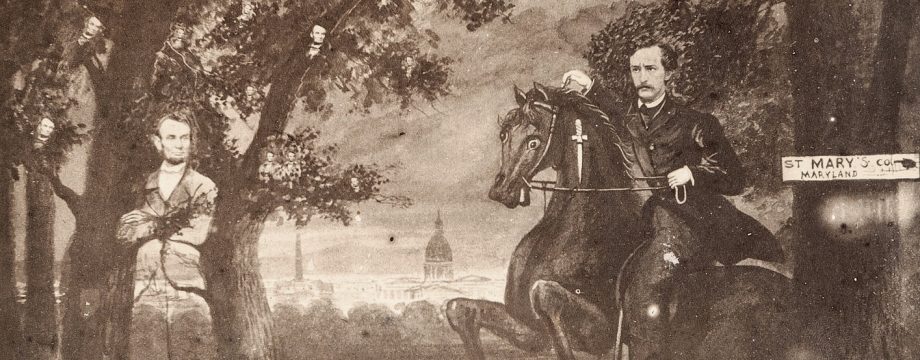Friday, June 30, 1865
Previous Session Trial Home Epilogue
Proceedings
The court convened at 11 o’clock.[1]
Present: All nine members of the military commission, Judge Advocate General Joseph Holt, and Assistant Judge Advocates Bingham and Burnett.
Absent: The eight conspirators, the recorders of the court, and all of the defense lawyers.
This was the second day of deliberations in order to determine the guilt and sentencing of the eight conspirators on trial. On the previous day, the cases of all of the conspirators except for Dr. Mudd had been determined with only the question of Dr. Mudd’s sentence still outstanding.
The commission lost little time and began to deliberate on Dr. Mudd’s punishment. In the end, the commissioners decided on the same punishment as had been given to Michael O’Laughlen and Samuel Arnold on the day before. Dr. Samuel A. Mudd was sentenced, “to be imprisoned at hard labor for life at such penitentiary as the President of the United States shall designate.”[2]
In June of 1883, eighteen years after the trial of the Lincoln conspirators, reporter and author George Alfred Townsend (known as GATH) traveled to Charles County, Maryland and interviewed Frederick Stone, the attorney who represented David Herold and co-defended Dr. Mudd. Stone gave his recollections about the trial which can be found in the Recollections section below. Applicable here, however, is Stone’s apparent knowledge of the voting that occurred in the case of Dr. Mudd, even though none of the defense attorneys were present during the deliberations. Dr. Mudd had died in January of 1883, leaving Stone more comfortable to talk openly about his former during his interview with GATH. During that interview Stone stated:
“The court very nearly hanged Dr. Mudd. His prevarications were painful; he had given his whole case away by not trusting even his counsel or neighbors or kinfolks. It was a terrible thing to extricate him from the toils he had woven around himself. He had denied knowing Booth when he knew him well. He was undoubtedly accessory to the abduction plot, though he may have supposed it would never come to anything. He denied knowing Booth when he came to his house when that was preposterous. He had been even intimate with Booth. The proclamation of the government was straightforward, that death should be the penalty of any man who could give information about the convicts and would not do it. Yet Dr. Mudd was saved, and it is understood that the vote stood five to four. One more vote would have hanged him, as two-thirds of a court martial is necessary to allot the death penalty.”[3]
How Stone came to learn that a vote for death had been taken in Dr. Mudd’s case, and that such a vote came out five to four, is unknown. But, if Stone is correct in this, it demonstrates how close Dr. Samuel Mudd came to paying the ultimate price.
With the sentencing of Dr. Mudd, the commission completed all of their deliberations. The record of the findings and sentences was signed by the president of the commission, Gen. David Hunter, and the Judge Advocates.
Sometime before the commission adjourned, a discussion was made regarding a recommendation for clemency in the case of Mary Surratt. Mrs. Surratt had been found guilty of both the specification and charge against her, and had received a vote of at least two-thirds to warrant a punishment of death. However, some of the commissioners felt that, despite her guilt, some consideration should be made to spare her life. The clemency petition was written as follows:
“The undersigned members of the Military Commission detailed to try Mary E. Surratt and others for the conspiracy and the murder of Abraham Lincoln late President of the United States etc. respectfully pray the President, in consideration of the sex and age of the said Mary E. Surratt, if he can upon all the facts in the case, find it consistent with his sense of duty to the country to commute the sentence of death which the Court have been constrained to pronounce to imprisonment in the Penitentiary for life.”[4]
This recommendation for clemency was signed by five commissioners, showing that the petition was not unanimously agree to by all nine. In courts-martial, recommendations for clemency like this were allowed and the commission followed the procedures for drafting such a petition correctly. However, it appears the commission or Judge Advocates failed to utilize the suggestion of the rules of courts-martial which stated that clemency pleas such as this should be, “written, as directed, immediately below the sentence, and this is observed as a better way than that of writing it upon a detached piece of paper, or making it the subject of a letter, – as such papers are liable to be mislaid or lost.”[5] In the aftermath of Mary Surratt’s execution, in which a large percentage of the public decried the hanging of a woman (regardless of her guilt), President Andrew Johnson would claim that he never saw this clemency petition placing the blame of Judge Advocate General Joseph Holt for failing to make him aware of it. Holt would counter that the plea was on a separate page at the end of the findings and sentencing, and that he gave all such documents to the President. While it’s possible that the clemency recommendation was mislaid as cautioned, it is far more likely that Johnson saw the petition and ignored it.
With the paper containing Mrs. Surratt’s clemency recommendation added to the pile of papers containing the findings and sentencing of the commission, Judge Advocate General Holt announced that there was no further business before the commission. The court was officially adjourned sine die – which is Latin for “without a day” – meaning indefinitely. The findings and sentencing of the court were then sent to the President for approval.

On July 5th, President Andrew Johnson officially approved the conspirators’ sentences and ordered that the execution of Mary Surratt, Lewis Powell, David Herold, and George Atzerodt take place on July 7th. In addition, Johnson ordered that the remaining conspirators, Dr. Samuel Mudd, Samuel Arnold, Michael O’Laughlen, and Edman Spangler, be sent to the state penitentiary in Albany, New York to serve their prison sentences. This would later be changed to the far more isolated military prison of Fort Jefferson, located on a group of islands 68 miles west of Key West, Florida in the Gulf of Mexico. With the approval and carrying out of the sentences, the trial of the Lincoln assassination conspirators came to an end.
Recollections
“The Commission met this morning and we soon finished up our affairs, and adjourned sine die.”[6]

Frederick Stone, lawyer for David Herold and Dr. Mudd, gave the following recollections of the trial to reporter George Alfred Townsend in 1883:
“A lawyer in the South who defended one of the conspirators against President Lincoln’s life recently said to me: “I recollect one little instance of the gentility of Governor Hartranft, of Pennsylvania, which I often mention. After Mrs. Surratt had been some time on trial and found the evidence deepening against her and her own contradictions painfully apparent, she became alarmed for her life; and, indeed, she had been, from the beginning. She sent me word that she wished to see me. The rule of the court-martial was that the prisoners should see their counsel in the presence of a guard but not necessarily in the hearing thereof. As it was a military court, of course every order it issued had to be obeyed strictly. Mrs. Surratt occupied one of the cells in the old penitentiary. They were arched cells, hardly high enough for one to stand in upright, and with barred doors, and between each pair of cells stood a sentinel in the corridor to keep the occupants from exchanging conversation. Mrs. Surratt was brought out. She was ironed, but not heavily, like the others. There was a soldier in the room, and General Hartranft, as he was at that time, for he was in command of the prison, seeing the counsel come into the room shook his head at the guard, intimating for him to go out. Hartranft, without saying a word or nodding his head to the prisoner and counsel, then retired to the distant end of the room and looked out of the window, thus keeping the letter of the severe law but relaxing its spirit.”
Said my informant above: “Reviewing the trial of the conspirators against President Lincoln’s life, I have to say that, considering it was a military court, it was a fair court and one of ability. Judge Holt, the Advocate-General, was a very able man. The Court was courteous toward the defence. This was shown by the fact that an orderly sergeant was sent away down through lower Maryland to deliver at the house of Mr. Stone Herold’s request that he come up and be his counsel. It was manifest to me from the start that this court meant to find guilty any person connected with the murder or the intended murders, but that they only mean to imprison or to give lighter punishments to accessories and those playing the spy or in the abduction plot. The court therefore set itself seriously to work to ascertain who had consented to take arms and kill, whether they succeeded in killing anybody or not. Taking into consideration the feeling of the time and the enormity of the offence, I do not know but that they drew the lines of justice pretty well in their intention. Consequently they found Atzerodt guilty, because he had accepted a knife to kill Vice-President Johnson. They found Herold guilty, because he knew of the murder about to be committed and accompanied the assassin to the last and assisted him to escape. As to Powell, generally called Payne, he thoroughly admitted the justice of his sentence and regarded the whole trial in the light of a reminiscence, bending his mind upon death, which he knew he had obtained and would get. He was the only person in that bar who had any philosophy or composure whatever, because his mind was made up that he could not escape…
…“I think,” said my legal friend, “that Mrs. Surratt could have been saved with proper counsel.” “What was the character of her counsel?” “She had two men named Aiken and Clampett, neither fit to defend a case of that importance. It is a remarkable fact that the bar in Washington City was ransacked for a lawyer to defend her and none would come forward. The effect of Lincoln’s death, the immediate recognition of his justice and generosity and of the causeless assassination, paralyzed the bar. Reverdy Johnson was finally employed. He came forward and made an argument against the jurisdiction of the military court, to be read and applauded by the people, and then abandoned the woman. What did those soldiers care about the legal argument on the jurisdiction of the court? They were set there by their superiors to ascertain who took part in the murder of their loved commander. It was from her own sense, plain as that was, that Mrs. Surratt felt that she was being sacrificed by the incapacity of her counsel. She then made the appeal for help, but the man to whom she made it had double work already, and was trying to save the life of Dr. Mudd and barely did it.”
“Was the combined character of those prisoners at all consequential?” I asked. “No. Cheaper, smaller materials never were engaged in a foolish scheme. The scheme to run Mr. Lincoln out of Washington was absurd from the start. Booth perhaps had a transmitted crack in his head, and we can understand how he thought the design was all right, but what can be thought of the common sense of persons like John Surratt and Dr. Samuel Mudd, an educated physician, who harbored the same idea? Dr. Mudd was an ill-balanced man, of very slight force of character, but little moral courage, a petulant temper, and it is hard to denote his ability anywhere. There are a few young men in Maryland who believe that Surratt was the sharpest fellow in the conspiracy. He at least saved his life. I knew from the very beginning that he was not in Washington at the time of the assassination, and yet the government, with strange fatuity, went on to insist that he was there. But I can hardly wonder at this because there was a tailor who positively swore that he saw Surratt the evening Lincoln was killed and knew him well because he had made a suit of clothes for him. In exciting times men lose their memory and consecutiveness, and thus the government, particularly in the civil trial of John Surratt, was led astray by its own witnesses.”
“As to Spangler, the scene-shifter, it was pitiful to see that poor fellow in dread of the gallows. He said one day piteously to me: ‘Do you think they will hang me?’ After the court that day I broke my silence and said to two of the members, Judge Bingham one of them: ‘Gentlemen, it is no personal concern of mine, but I really do not see what you can hang poor old Spangler for, except finding a rope in his bag which it is plain he used to catch crabs with and stole it from the theatre for that purpose.’ They smiled and took it in good prat. Spangler finally became poor and seedy and broken down with liquor, and he went to live with Dr. Sam Mudd, who allowed him to stay at his house, and I think he is buried at the Catholic cemetery at Reeves’ Church, near Mudd’s house, or possibly at the Bryantown Church. He died about two years before Dr. Mudd.”[7]
Previous Session Trial Home Epilogue
[1] William C. Edwards, ed., The Lincoln Assassination – The Court Transcripts (Self-published: Google Books, 2012), 1213.
[2] Edwards, Court Transcripts, 1213.
[3] New-York Daily Tribune, June 17, 1883, 4.
[4] Official copy of the Clemency Petition for Mary Surratt (Document: Library of Congress, Joseph Holt Papers).
[5] William C. DeHart, Observations on Military Law and the Constitution and Practice of Courts Martial (New York: D. Appleton & Co., 1864), 199.
[6] August V. Kautz, June 30, 1865 diary entry (Unpublished diary: Library of Congress, August V. Kautz Papers).
[7] New-York Daily Tribune, June 17, 1883, 4.














Pingback: The Trial Today: June 30 | LincolnConspirators.com
I will miss this!